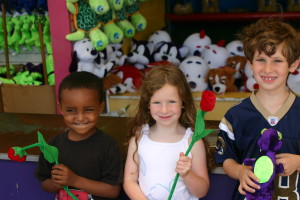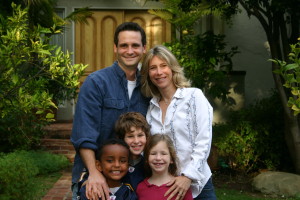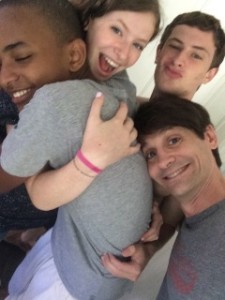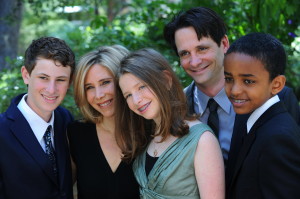Meet Later Dad: Claude Knobler
NAME: Claude Knobler
AGE: 49
RELATIONSHIP STATUS: Married 20 Years
RESIDENCE: Los Angeles, CA
CHILDRENS NAMES/AGES: Clay 18. Grace 16. Nati 16.
(Note: Claude was 39 when they adopted Nati, his third child.)
I am the author of More Love, Less Panic: 7 Lessons I Learned About Life, Love, and Parenting After We Adopted Our Son from Ethiopia. You can read all about the book and a bit more about my family on www.morelovelesspanic.com.
What was your road to parenthood like? My first two kids came along in a fairly traditional way. I’d always thought I’d have kids, ‘some day.’ Then, one day, my wife told me that she wanted to have kids, and that ‘some day’ had more or less arrived. I’m grateful to her for nudging me along because otherwise, like a lot of guys, I think I might have just waited and waited and waited some more.
Our third child, Nati, was more my idea…in a way. I read a magazine article about the many children in Ethiopia who’d been orphaned because of the AIDS crisis. I suggested that my wife read the article and that we consider adoption, but, honestly, I was sure we never really would. When she read the article and said, ‘you know, actually, we could adopt a kid from there,’ I was stunned. Not too long after reading that article, I was flying home from Ethiopia with a five-year-old boy who was now my son.
What was your motivation to write your book? The day I met Nati, he was five years old. He didn’t speak a word of English, and I didn’t speak a word of his language, Amharic. We were as different as we could possibly be, but we were from that moment on, family. I had thought that what would be most challenging about raising Nati would be the fact that we didn’t speak the same language and that he was black and I was white, but I found those things didn’t matter much at all. What did matter was that I’d adopted the most exuberant, silly, loud, and confident little boy I’d ever laid eyes on.
True story: When Nati had been home with us for three months, my wife and I decided to take a road trip with the kids down to San Diego. As I began driving, I started to hear a heavily accented voice in the back seat saying, “No Dad! Not ziss way. Go other way!” It was my new son actually telling me the best way to get to San Diego. And no, he didn’t know where San Diego was, or even what San Diego was, but yes, he was pretty confident that his way was the right way to get there.
The two kids we already had, my son Clay and my daughter Grace, were quiet, polite and gentle, sort of like my wife and I. Nati, on the other hand, was a one man marching band. He shouted, laughed, and made as much noise as he could whenever he could. With the very best of intentions, I began trying to ‘parent’ him so he’d change. I thought I could make him a little more quiet, a little more mellow, a little more, well, like me. What I eventually realized was that you simply cannot turn an exuberant giddy Ethiopian kid into a neurotic Jewish kid.
The next thing I realized was that everything I was learning as I parented Nati was true for my biological children too. As I learned it wasn’t my job to change Nati, but to love and accept him, I began to see that much of what I considered parenting was really just my trying to control the uncontrollable. As I became a happier, better parent, I realized…you know, this might be a book.
 What do you see as the positives and challenges of having a child later in life? As I’ve grown older, I’ve gotten not so much calmer and more aware of how silly I am when I’m not being calm. I can, even in moments of panic (and you get a lot of those when you have three kids), pause and think, well, this might not seem like such a big deal in a few months or years. Being able to pause and ask yourself, ‘If my son doesn’t keep his room clean when he’s ten, does that really mean that he’ll never be able to stay in a relationship or a job when he’s 30?’ is a huge asset. The more I pause, the happier I am; and the older I am, the better I get at pausing.
What do you see as the positives and challenges of having a child later in life? As I’ve grown older, I’ve gotten not so much calmer and more aware of how silly I am when I’m not being calm. I can, even in moments of panic (and you get a lot of those when you have three kids), pause and think, well, this might not seem like such a big deal in a few months or years. Being able to pause and ask yourself, ‘If my son doesn’t keep his room clean when he’s ten, does that really mean that he’ll never be able to stay in a relationship or a job when he’s 30?’ is a huge asset. The more I pause, the happier I am; and the older I am, the better I get at pausing.
On the negative side, I do find that all three of my children like to mock the way I make weird noises whenever I have to get off the couch.
Has anything about being a dad surprised you over the years? One of the really surprising things about having a few children is that you realize just how much kids are who they are from the very start. When I first met Nati in Ethiopia, we spent a few days together in a hotel, while we were waiting for our paperwork to be cleared so we could go home. One day, he walked up to a woman at the front desk and exchanged a few words in Amharic with her. And then he started dancing. When the woman laughed, I asked her what was going on, and she told me my new son had just announced that “Speaking English is easy! And I can dance.” Of course, he’d said all that in Amharic, since, again, he didn’t know how to speak English. But that was Nati from the start; loud, confident, and silly. My daughter has always been sweet and friendly and used to greet complete strangers in the supermarket with a cheerful ‘hi!’ almost before she could walk. My oldest son has always been quiet, kind, and easy going.
I used to believe that as I got older, I’d be more in control of the things and maybe even the people around me, but every day, I learn that my job isn’t to shape and change my kids; it’s just to love them as they are, and as they’ve pretty much always been. They are perfect as they are. There is a place for quiet and easy going adults in this world just as there’s a place for brash, confident adults. Being a father at this point in my life is all about accepting and even cherishing the people around me for exactly who they are. I like to think that’s a confidence and peace that comes with age. Then again, it might also be that after years of trying to force people to change, I’ve finally just gotten tired of that!
 Can you share a funny or AHA parenting moment? During Nati’s first year with us, we threw him a birthday party. We were pretty nervous about it. The truth is, we weren’t all that sure how his new classmates were reacting to him. His English wasn’t perfect, there weren’t that many black kids in his school, and he was, well, pretty goofy. Sometimes for no apparent reason, he’d break into what my wife and I called ‘the Mishashu’ song. The Mishashu song, would involve Nati wiggling his backside and shouting out the words, ‘Mishashu! A lubba-lubba-lubba.” At first we thought he was singing an Ethiopian song from back home, but actually it was just something he invented by himself. And he sang it a lot. So we really didn’t know what all those kids were thinking about our son. And to be honest, we were pretty afraid that he might not be all that popular and that kids, being kids, mostly just thought he was weird.
Can you share a funny or AHA parenting moment? During Nati’s first year with us, we threw him a birthday party. We were pretty nervous about it. The truth is, we weren’t all that sure how his new classmates were reacting to him. His English wasn’t perfect, there weren’t that many black kids in his school, and he was, well, pretty goofy. Sometimes for no apparent reason, he’d break into what my wife and I called ‘the Mishashu’ song. The Mishashu song, would involve Nati wiggling his backside and shouting out the words, ‘Mishashu! A lubba-lubba-lubba.” At first we thought he was singing an Ethiopian song from back home, but actually it was just something he invented by himself. And he sang it a lot. So we really didn’t know what all those kids were thinking about our son. And to be honest, we were pretty afraid that he might not be all that popular and that kids, being kids, mostly just thought he was weird.
When the whole class showed up for his birthday, we were elated. My ‘aha’ moment however came a bit later, when, as the party got going, one by one, various kids began shouting out, “Mishashu!” till another kid would answer out, ‘A lubba-lubba-lubba!’ Then, suddenly, they were all doing it. An entire group of American children were singing my son’s nonsense song. A moment later, they had all spontaneously formed a circle around Nati, who was dancing to their giddy cheers.
I had thought that I needed to parent my new son, or in other words, to change him, ever so slightly, so he could fit in. I thought I needed to teach him to be calmer, quieter, and more, well, more like me. In fact, what I realized as every one of his classmates stood near me chanting his name, was that not only couldn’t I change who he was, I shouldn’t change who he was. Mishashu!
 What do you most want to teach your children? I love this question. What I most want to teach my children is how to be happy right now, in this moment. It’s not that I think happiness is the goal of life. It’s just that I tend to believe that the happier I am, the more useful, kind, and loving I can be to the people around me. I want my kids to know how to love and how to be loved. I want them to find work that engages them and lets them contribute to their communities. I want them to find themselves by giving to others. I want all those things, but my experience has been that the first step towards gaining all of that lies in knowing how to joyfully experience the world and the people around them. Though to be fair, when my first born was younger, most of what I wanted to teach him was to root for the Red Sox. It was mostly coasting after that.
What do you most want to teach your children? I love this question. What I most want to teach my children is how to be happy right now, in this moment. It’s not that I think happiness is the goal of life. It’s just that I tend to believe that the happier I am, the more useful, kind, and loving I can be to the people around me. I want my kids to know how to love and how to be loved. I want them to find work that engages them and lets them contribute to their communities. I want them to find themselves by giving to others. I want all those things, but my experience has been that the first step towards gaining all of that lies in knowing how to joyfully experience the world and the people around them. Though to be fair, when my first born was younger, most of what I wanted to teach him was to root for the Red Sox. It was mostly coasting after that.
What do your children think of your work? I don’t think my children consider what I do to be work, and I’m not sure I’d disagree. When they were still very young, I was paid to review movies on radio stations around the country. After that, I became a Trophy Husband, and was in charge of cooking for them, cleaning up after them, and driving them places. On my best days, none of that really feels like work, which is what, ideally, will happen for them one day. As for the book I’ve written, they’re excited and proud. Nati also would like a share of the royalties.
What influence, if any, has your own mother or father had in your life and in your parenting? My mother grew up in Belgium during WWII, and because she’s Jewish, had to be hidden in a Catholic orphanage. She took a Catholic name and was raised by nuns till the war ended. Having lost her own parents in the Holocaust, my mother taught me throughout my childhood the importance of family. More than that though, I learned, both from her story and from the way she behaved, that what I did or did not do could change lives. The nuns who saved my mother’s life, saved my own life in a way. My mother’s many acts of kindness and charity showed me that it was possible for any one person to make the world a better place. All of that influenced my life in the best possible way.
When I see the relationship my father and mother have with my own kids, it’s impossible not to come away as a slightly different and better parent. My father is very close to all of his grandchildren, but he and Nati really are two peas in a pod. They like to discuss the stock market together, and in a great many ways, Nati and my dad are, amazingly, alike. More importantly, my parents enjoy their grandchildren. Like grandparents everywhere, they indulge them and marvel at them and think that everything they do is amazing and wonderful. And, not so surprisingly, their grandchildren, in return, love and adore them and treat them with kindness and respect. The very act of loving and enjoying a child helps that child become the best possible version of themselves. On my best days, I try to grandparent my own kids whenever possible!
 What words of wisdom would you most like to share with others contemplating becoming a parent? I have this theory that every two years, I used to be silly.
What words of wisdom would you most like to share with others contemplating becoming a parent? I have this theory that every two years, I used to be silly.
Let me explain. When my eldest son was three, I worried about his inability to sleep through the night. Then, when he was five, I realized that fear had been silly. He grew out of that stage all on his own. Now, I was worried that he couldn’t read. What would become of him?! He was falling behind and all the other Kindergartners seemed to read with ease! Then, when he was six, I realized how silly I’d been. Of course, he learned to read, and the fact that he learned a few months after some of his classmates hadn’t mattered at all. Besides, now I was worried about something really important….see what I mean? Every two years, the fears I used to have seem silly.
When Nati first came here, I worried that I’d never be able to communicate with him since we spoke different languages. When, in a few months, he was speaking English, I worried about other stuff…all of which in a short while turned out to be fine.
I’m bad at worrying. Most parents are really bad at worrying. We worry about the wrong things, and because we love our children so very much, our eyes become like magnifying glasses, turning small concerns into major panics.
So here are my words of wisdom: More Love, Less Panic. (How’s that for a shameless plug?)
Do you recall anything from your own upbringing that really stuck with you that you’d like to pass on to your children or other parents? It’s funny. My parents tried to teach me a great many things, but mostly what I think about when I think about them are the tiny, silly things. I remember how we all burst out dancing after we watched the movie Singing In The Rain together, and I remember how my sister and I used to sit on my father’s lap, one on each leg, every Sunday morning. I know my parents spent a lot of time worrying about my future, what I’d do and how I’d manage in the world, but in the end, I simply found my way in life the way so many people do. I had good experiences and bad experiences, and ultimately I found jobs that made sense for me and people who loved me for who I am.
When your kids are young, they feel like they are your whole life, and that’s how it should be. But my eldest son is now in college and lives three thousand miles away from me. I can’t wait to see him, of course, and we talk all the time, of course, but the truth is, your kids are only kids for a short while. I know my parents tried to teach me a lot about life, and I know that they succeeded in that aim, but I also know that what I took the most from them was love.
My parents spent years and years giving me a hard time about my filthy room, and I can’t blame them for that, since I did, in fact, live like an animal. My laundry was always on the floor and my room always looked like a disaster site. And now, I’m a grown man. Every morning I make my own bed. I do the laundry and I clean my dishes every night. The thing is, I didn’t grow up because of the time my parents spent yelling about my room. I grew up because that’s what happens. I got older, and I began to notice that girls didn’t want to come over to an apartment that looked like a tornado had hit it. I simply outgrew being a child. You can spend your children’s childhoods struggling with them and trying to force them into becoming something they may never become. Or, you can relax and love them for who they are. They’re going to grow up either way; the only question is, how do you want to spend the time you have with them? Me, I go with More Love, Less Panic (2nd shameless plug!)















